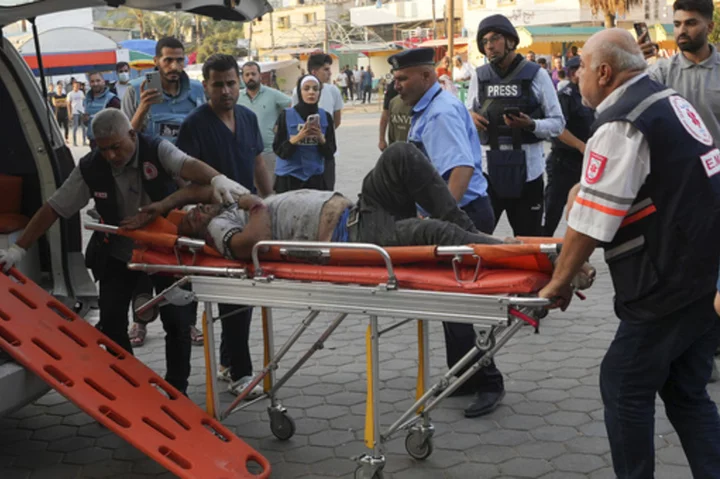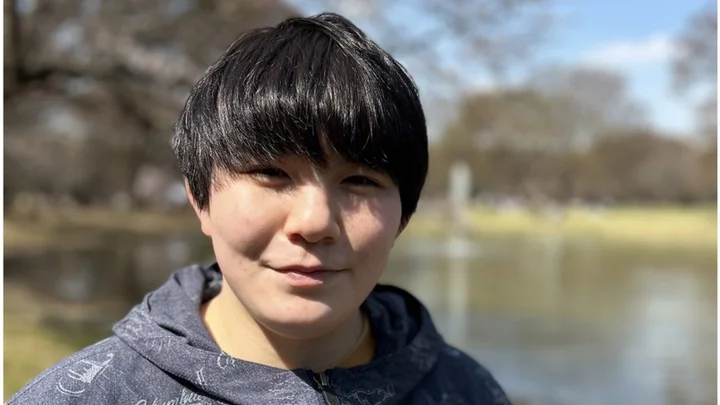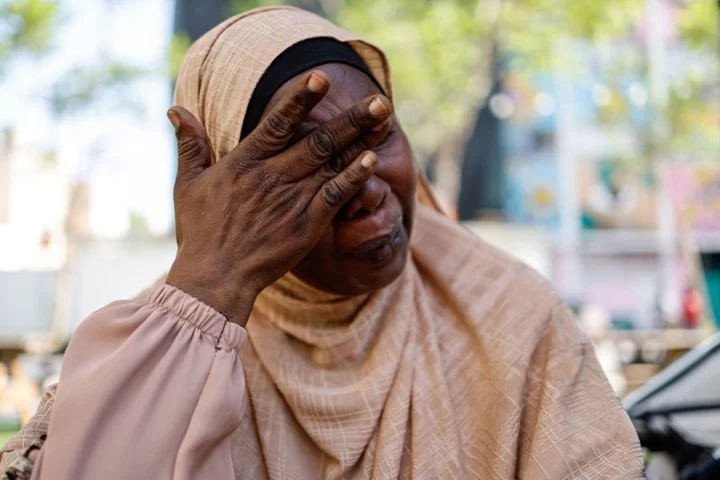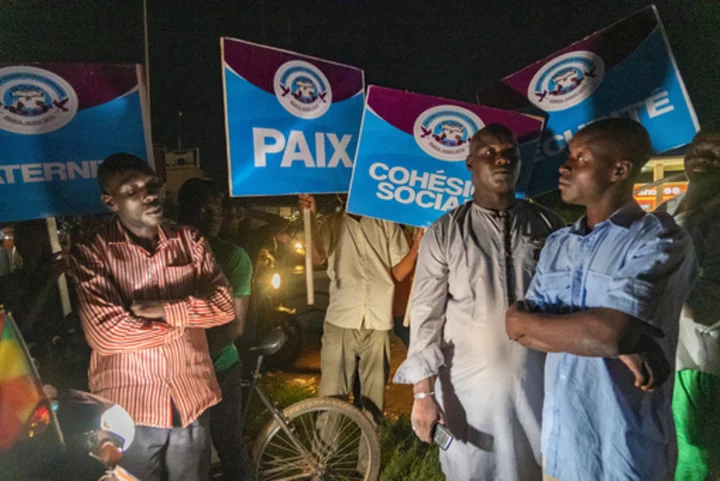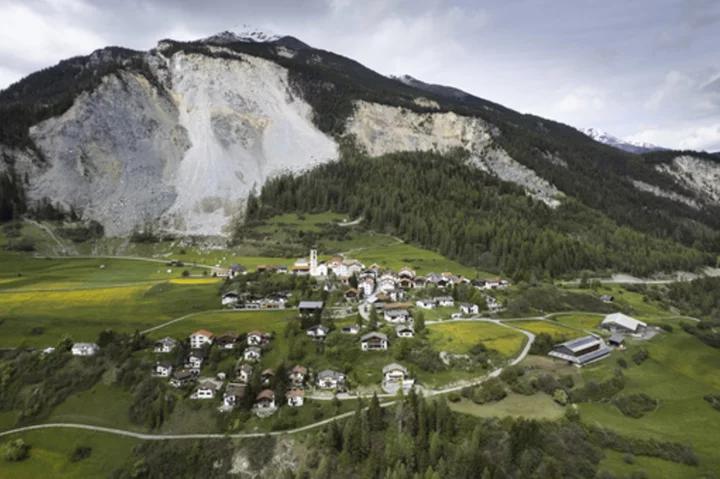NEW YORK (AP) — A limited number of journalists in Gaza are trying to report on the war with Israel while facing the same problems as the besieged Palestinian population there — wondering where to live, where to get food and water, and how to stay safe.
The aftermath of Tuesday's explosion that killed hundreds at a Gaza City hospital is the latest example of how that reality hinders the world's ability to get a full picture of what is happening to the Palestinian population In Gaza.
Outside journalists have been unable to enter Gaza since the Hamas attack in Israel on Oct. 7. The sole entry point for journalists, Israel's Erez crossing, was attacked in the rampage and remains closed. A handful of news organizations had maintained a regular presence with bureaus there, including The Associated Press, the BBC, Reuters, Agence France-Presse and Al-Jazeera, with a network of stringers helping others.
Israel's order to Palestinians to evacuate the northern part of Gaza led journalists at AP and AFP, for example, to abandon bureaus in Gaza City and head south.
“Working in Gaza right now is extremely difficult and that's in large part because our staff are both covering the story and worrying about their own safety and the safety of their families,” said Julie Pace, executive editor and senior vice president of The Associated Press.
AP staff stocked up on bottled water and other supplies before abandoning their Gaza City bureau, which replaced an office destroyed by Israeli bombs in 2021.
Even with power supplies limited, AP staff members have provided photos, video and other reporting each day since the war's start, Pace said. No such luck for a camera left behind on the bureau's balcony that provided a live stream of the skyline; the generator likely ran out of fuel.
The nine Agence France-Presse journalists in Gaza feel caught in a squeeze between wanting to work and also take care of their families, said Phil Chetwynd, global news director. Managers are stressing the importance of safety first, he said.
“This is a population that over the years has been used to fairly extreme situations, but I think they would all say that this is on a much, much bigger scale,” Chetwynd said, referring to the previous four wars between Israel and Hamas.
At least 19 journalists have been killed since the start of the war, 15 of them in Gaza, the Committee to Protect Journalists said Wednesday. Already, more journalists have been killed in Gaza during the past two weeks than in the territory since 2001, said Sherif Mansour, CPJ's Middle East and North Africa coordinator.
On CNN, journalist Ibrahim Dahman reported on the journey to find safety that he took with his wife and two sons, ages 7 and 11. One son plaintively asked when they found a room: “They don't strike hotels, right?”
“I feel intense fear,” Dahman said. “I am worried about myself, my wife and my children.”
AP photojournalist Adel Hana’s family fled to the central Gaza town of Deir al-Balah, below the evacuation line, to shelter in a cousin’s home near the local hospital. But a series of blasts rocked the building, killing at least seven family members and burying women and children in the rubble, he said.
“It doesn’t make sense,” Hana said. “We went to Deir al-Balah because we thought we would be safe.”
Marwan al-Ghoul, working for CBS News, was similarly heading south with his family in Gaza. When he came upon the aftermath of a bombing in a residential area, he got out to film scenes of bodies buried in rubble and crying children walking through the bombing site.
The need to bear witness, the journalists said, came after a week of intense focus on the attacks in Israel, where news media have been working freely. News organizations are conscious of the need to show that there is suffering on both sides.
Even with fewer news organizations operating in Gaza, there is a rich journalism tradition there, said Andrew Roy, CBS News' Jerusalem bureau chief. With advances in technology, many people are able to tote cameras to noteworthy scenes, he said.
That was the case after Tuesday's explosion at al-Ahli hospital. “You can often show people things that in the past you would not have been able to show,” Roy said.
Even without a full-time staff member in Gaza, The New York Times offered on its website Wednesday a graphic that detailed the hospital grounds, an overhead still picture of the blast scene that showed burnt-out cars and video that depicted the fiery aftermath of the explosion , taken at some distance through a fence. The Times said it had independently verified the video's accuracy.
Still, the material doesn't replace professional journalists able to quickly reach the scene and interview people there.
“Eyewitness reporting is the best, being able to report what you see,” said Luke Baker, Jerusalem bureau chief for Reuters between 2014-2017. Experienced journalists are also more apt to know sources they can depend upon for truthful information, he said.
In the aftermath of the al-Ahli hospital explosion, journalists were left to sift through the competing finger-pointing over which side was to blame. “The truth does matter,” Rachel Maddow said on MSNBC's overage. “It's the only thing we have here.”
In past Gaza conflicts, the Internet was a useful source of information and videos. But the spread of disinformation online this time has made it much less reliable, and verifying material that can be trusted is enormously time-consuming, Chetwynd said.
As the story moves forward, news organizations are looking for ways to compensate for the barriers faced by journalists in Gaza. The AP, for example, has assigned a team of Arabic-speaking journalists to conduct interviews and monitor online activity.
For those left in Gaza, Pace said there's a concern about when supplies are going to run out without reinforcements, including power.
“It's not constant and it's not reliable,” she said.
CPJ's Mansour said that he hopes the United Nations keeps the welfare of journalists on its agenda, including safe passage out of the country for those who need it.
“The people who live in this place didn't make the decision to live in a war zone,” Chetwynd said.

